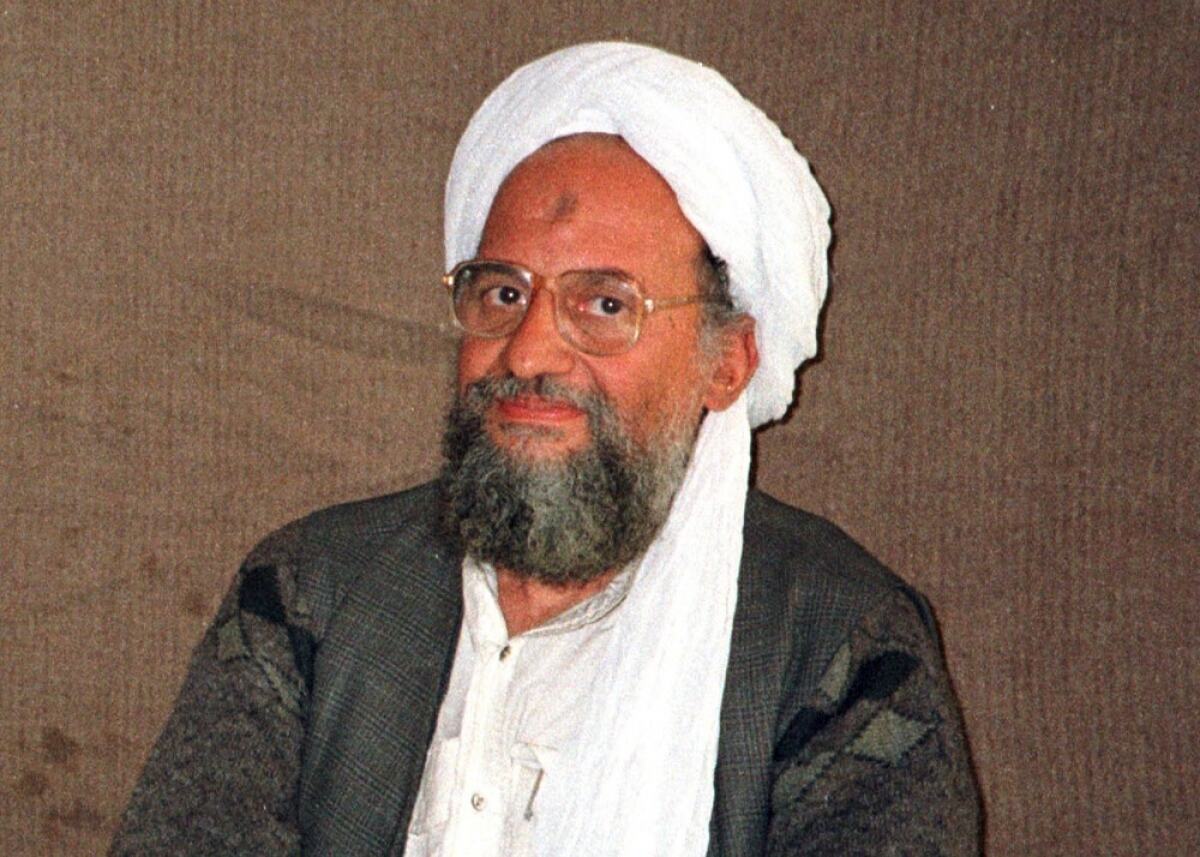Rooting out the last fragments
Ayman al-Zawahiri’s killing has left al-Qaeda with a leadership crunch — which the Biden administration can target to eliminate the terror group permanently

The world at large heaved a sigh of relief when it was confirmed that the dreaded 70-year-old Al Qaeda Chief Ayman al-Zawahiri was killed by a missile attack in Kabul late last month. The Americans, who had wriggled out of Afghanistan exactly a year ago, had some face saving by the precise intelligence-based operation neutralising Zawahiri on the lines of the killing of Osama bin Laden more than 11 years ago. Whatever, it is surely seen as a welcome development for counter-terrorism experts all over the world. Having said this, it is important to examine the implications of Zawahiri's death. It needs to be seen if his death will bring an end to terror in future; lessen suicide attacks; and lower the number of cases of Islamic radicalisation in the Indian subcontinent and in South East Asian countries including Indonesia, Malaysia, tracts of Southern Thailand, parts of the Philippines etc.
With regard to the significant development, it can be stated with some amount of conviction that al Shabab in Somalia and Boko Haram in Nigeria plus al Qaeda's other affiliates in Mali, Mauritania, Burkina Faso and other countries in Africa, hitherto drawing inspiration and strength from the Al Qaeda, stand demoralised and rudderless minus Zawahiri. Yet, the security and intelligence agencies the world over need not be complacent after Zawahiri's killing because the euphoria generated soon after Osama bin Laden's extermination did not last long, and the world did not see any notable reduction in the cases of violent Islamic terror attacks. This was evidently clear after the Charlie Hebdo terror attacks in France and similar attacks in other countries. The world also saw a spate of religiously inspired terror assaults which did not allow the global community and the security fraternity to lower their guards against the mounting terror. Possibly, Afghanistan remains the worst hit with repeated terror incidents even inside the places of worship and the rise in suicide attacks even during the holy month of Ramadan. This exemplifies that terrorists have scant respect for religion — resulting in indiscriminate killings of innocents, including that of hapless women and children.
According to Bill Roggio, a terrorism expert and editor of the Long War Journal, the Kabul house in which Ayman al-Zawahiri was killed was, in fact, owned by Sirajuddin Haqqani, the Taliban's Interior Minister. Additionally, experts and analysts believe that Zawahiri was in Pakistan and was moved to Kabul in the care of Sirajuddin Haqqani.
Interestingly, Zawahiri was killed not in a shelter in the mountains but while he was enjoying the cool of the morning sitting on the balcony of a pretty pale pink villa, in the centre of Kabul — Sherpur neighbourhood, one of the most exclusive residential areas of the city. And the house – surprise again – was owned by Sirajuddin Haqqani.
In the meantime, authorities on counter terrorism assess that Zawahiri's death now places al-Qaida in a precarious position. Can its next emir unite and inspire a new generation of jihadists — a cohort that is currently far less enthusiastic than its predecessors about traveling abroad to fight in civil wars and insurgencies? If al-Qaida is unable to decide on a new leader, dissent could emerge, further constraining the organisation at a critical juncture.
Many counterterrorism analysts, particularly Colin P Clarke who is the director of research at the Soufan Group and a senior research fellow at the Soufan Center, reckon that the logical successor to Zawahiri is veteran jihadist and fellow Egyptian Saif al-Adel, a longtime Zawahiri confidante and a trusted lieutenant. But Adel has been living under a semi-house arrest in Iran, where the regime is keeping a watch on al-Qaeda senior leadership who fled there after the US invasion of Afghanistan in late 2001. If Adel is ultimately judged to be too vulnerable due to his presence in Iran, or too old to appeal to new recruits, then al-Qaida is left with only a few choices that could gain widespread acceptance. Some were listed recently in a United Nations report, including Zawahiri's son-in-law Abdal Rahman al-Maghrebi, the Algerian Yazid Mebrak of al-Qaida in the Islamic Maghreb, and the Somali Ahmed Diriye, the current leader of the al-Shabab extremist group. In a sign of how badly the group has been damaged, no names from al-Qaida's once-vaunted Yemeni affiliate — al-Qaida in the Arabian Peninsula — appear on the horizon.
Division in Al Qaeda is also not ruled out. The prominence of the conflict in Syria since 2011 has led some within jihadist circles to argue forcefully for the elevation of an individual like Abu Abd al-Karim al-Masri, a high-ranking member of al-Qaida's Syrian branch Hurras al-Din. Importantly, the remaining period of 2022 will be a crucial period for al-Qaida. The US and its allies have sought to move on from the global war on terrorism, pivoting to great power competition with countries like China and Russia. Given the ongoing war in Ukraine and increased tensions across the Taiwan Strait, it's perhaps safe to say that the Biden administration is mostly focused on national security priorities other than terrorism.
Eliminating Zawahiri was an important achievement, but the US and its allies now must remain focused on completing the job and eliminating al-Qaida permanently by maintaining an operational momentum, while simultaneously getting rid of the appeal and resonance of its ideology in regions where it still flourishes.
The writer is a retired IPS officer, a security analyst and a former National Security Advisor to the PM of Mauritius. Views expressed are personal



